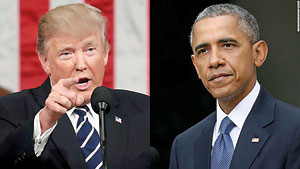Sunday Times 2
Obama’s letters and Trump’s delusions
TOKYO – When was the last time you sat down and wrote a letter? I don’t mean an email or a text message; nor would I count a dictated message to a machine or a personal assistant. No, I mean an old-fashioned “Dear Donald” or “Dear Hillary” letter. The reason I ask is that 65,000 people actually did write such letters to Barack Obama every week when he was serving as president of the United States. According to a recent feature in The Guardian, a team of White House staffers would select ten letters each day to pass along to the president, who would then respond to them personally that evening.

Trump and Obama
Was this nightly ritual a waste of time for the most powerful leader in the world? One might think that Obama would have been better served reading policy briefs on Syria or on the implementation of health-care reform. No doubt, he read those, too. But I suspect that he realized the value of a daily encounter with voters. His ritual was a partial solution to a fundamental problem that all political leaders face: keeping in touch with the real world.
Now consider Donald Trump. With a few honourable exceptions such as Secretary of Defence James Mattis, Trump is surrounded by people who will tell him that the world is as he believes it to be, rather than as it actually is. For the lickspittles of Trump’s court, dutifully confirming the president’s delusions is de rigueur. And the same goes for those on Fox News, who routinely tell their audience exactly what Trump wants to hear.
Of course, even leaders who are more like Obama than Trump struggle to apprise themselves of everything that is going on. Ideally, heads of state will have teams of dedicated public servants to ensure that political decisions are made with a full understanding of their context and consequences. In a democracy, leaders can and often must pursue courses of action that entail some risk. But they should do so only after having considered all of the facts.
Another problem is that the longer leaders are in power, the less they like being told that they are wrong. Political longevity breeds sycophancy. I personally witnessed this with former British Prime Minister Margaret Thatcher, who read her policy briefs and knew most of the issues inside out. Thatcher was most successful when she allowed her instincts to be challenged. But the longer she stayed in office, the more she assumed that she knew best.
Eventually, Thatcher’s epistemic isolation would bury her. She usually had a strong grasp of issues relating to the standard of living; and yet she failed to comprehend the impact that a new poll tax would have on household budgets. Ultimately, this – not some lofty debate about Britain’s place in Europe, as is often suggested – was what brought her down.
Moreover, navigating the demands of parliamentary accountability is not the same thing as engaging with voters. One can master all the political tricks of the trade to survive parliamentary debates or interrogations by committees. And if you are a minister, you should already know more about your subject area than any potential interlocutor. The real challenge comes when you meet your constituents.
To its credit, the British electoral system at least establishes a more or less direct relationship between MPs and the people who vote for them. Each MP represents a particular town, suburb, or stretch of countryside, and most go back each week to listen to voters and hold sessions known as constituency surgeries. On these occasions, people usually come to discuss housing problems, social-security benefits, or schooling; or they just want to grouse about some national controversy.
As a former MP, I can remember times when I had easily convinced Parliament that I was right about some policy decision, only to learn through face-to-face encounters with my constituents that I was not nearly as smart as I thought I was. When someone breaks down crying while trying to explain the impact that your decision has had on their life, you usually think twice about the issue.
Obama didn’t need focus groups to tell him that ordinary Americans were struggling to pay their medical bills and being denied treatment for preexisting conditions. He already knew that from reading their letters, some of which he had framed and placed on his wall.
No wonder health care is such a big issue in the US midterm elections this year. Perhaps the results will send a message to Trump. Rather than a letter, he might be handed a string of Republican congressional defeats. If it’s any consolation, he can find out about them on Fox News, where nothing is ever his fault.
(Chris Patten, the last British governor of Hong Kong and a former EU commissioner for external affairs, is Chancellor of the University of Oxford.)
Copyright: Project Syndicate, 2018. www.project-syndicate.org

